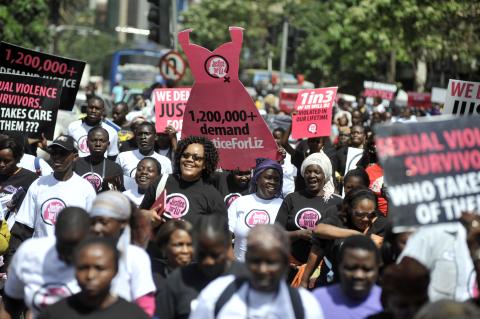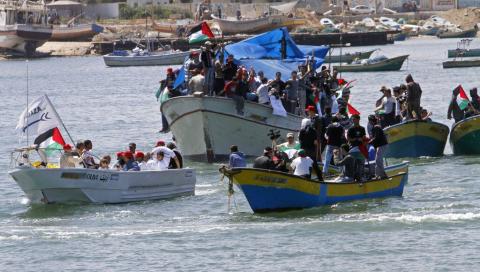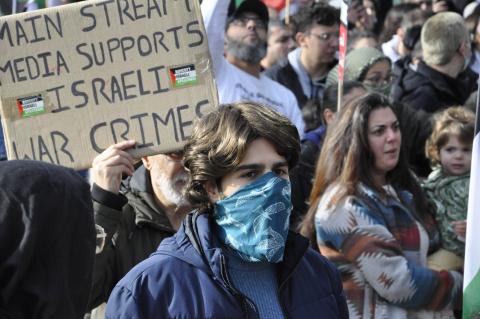Al Jazeera Journalism Review
Your Words Are Your Weapon — You Are a Soldier in a Propaganda War
Narrative warfare and the role of journalists in it is immense; the context of the conflict, the battleground has shifted to the realm of narratives, where journalists play a decisive role in shaping the narrative.

The Privilege and Burden of Conflict Reporting in Nigeria: Navigating the Emotional Toll
The internal struggle and moral dilemmas faced by a conflict reporter, as they grapple with the overwhelming nature of the tragedies they witness and the sense of helplessness in the face of such immense suffering. It ultimately underscores the vital role of conflict journalism in preserving historical memory and giving a voice to the voiceless.

Journalism in chains in Cameroon
Investigative journalists in Cameroon sometimes use treacherous means to navigate the numerous challenges that hamper the practice of their profession: the absence of the Freedom of Information Act, the criminalisation of press offenses, and the scare of the overly-broad anti-terrorism law.

The Perils of Journalism and the Rise of Citizen Media in Southeast Asia
Southeast Asia's media landscape is grim, with low rankings for internet and press freedom across the region. While citizen journalism has risen to fill the gaps, journalists - both professional and citizen - face significant risks due to government crackdowns and the collusion between tech companies and authorities to enable censorship and surveillance.

Orientalism, Imperialism and The Western Coverage of Palestine
Western mainstream media biases and defence of the Israeli narrative are connected to orientalism, racism, and imperialism, serving the interests of Western ruling political and economic elites. However, it is being challenged by global movements aiming to shed light on the realities of the conflict and express solidarity with the Palestinian population.

Ethical Dilemmas of Photo Editing in Media: Lessons from Kate Middleton’s Photo Controversy
Photoshop—an intelligent digital tool celebrated for enhancing the visual appearance of photographs—is a double-edged sword. While it has the power to transform and refine images, it also skillfully blurs the line between reality and fiction, challenging the legitimacy of journalistic integrity and the credibility of news media.

Silenced Voices: The Battle for Free Expression Amid India’s Farmer’s Protest
The Indian government's use of legal mechanisms to suppress dissenting voices and news reports raises questions about transparency and freedom of expression. The challenges faced by independent media in India indicate a broader narrative of controlling the narrative and stifling dissenting voices.

Targeting Truth: Assault on Female Journalists in Gaza
For female journalists in Palestine, celebrating international women's rights this year must take a backseat, as they continue facing the harsh realities of conflict. March 8th will carry little celebration for them, as they grapple with the severe risks of violence, mass displacement, and the vulnerability of abandonment amidst an ongoing humanitarian crisis. Their focus remains on bearing witness to human suffering and sharing stories of resilience from the frontlines, despite the personal dangers involved in their work.

A Woman's Journey Reporting on Pakistan's Thrilling Cholistan Desert Jeep Rally
A Woman's Voice in the Desert: Navigating the Spotlight

Breaking Barriers: The Rise of Citizen Journalists in India's Fight for Media Inclusion
Grassroots journalists from marginalized communities in India, including Dalits and Muslims, are challenging mainstream media narratives and bringing attention to underreported issues through digital outlets like The Mooknayak.

Why Journalists are Speaking out Against Western Media Bias in Reporting on Israel-Palestine
The article highlights how over 1,500 journalists are speaking out against Western media's biased coverage of the Israel-Palestine conflict, criticizing its dehumanizing language, lack of context, and disproportionate focus on Israeli narratives at the expense of Palestinian voices and journalistic integrity.

Silenced Voices and Digital Resilience: The Case of Quds Network
Unrecognized journalists in conflict zones face serious risks to their safety and lack of support. The Quds Network, a Palestinian media outlet, has been targeted and censored, but they continue to report on the ground in Gaza. Recognition and support for independent journalists are crucial.

Artificial Intelligence's Potentials and Challenges in the African Media Landscape
How has the proliferation of Artificial Intelligence impacted newsroom operations, job security and regulation in the African media landscape? And how are journalists in Africa adapting to these changes?

Media Blackout on Imran Khan and PTI: Analysing Pakistan's Election Press Restrictions
Implications and response to media censorship and the deliberate absence of coverage for the popular former Prime Minister, Imran Khan, and his party, Pakistan Tehreek-e-Insaf (PTI), in the media during the 2024 elections in Pakistan.

Digital Battlegrounds: The New Broadcasting Bill and Independent Journalism in India
New legislation in India threatens the freedom of independent journalism. The draft Broadcasting Services (Regulation) Bill, 2023 grants the government extensive power to regulate and censor content, potentially suppressing news critical of government policies.

Pegasus Spyware: A Grave Threat to Journalists in Southeast Asia
The widespread deployment of spyware such as Pegasus in Southeast Asia, used by governments to target opposition leaders, activists, and journalists, presents significant challenges in countering digital surveillance. This is due to its clandestine operations and the political intricacies involved. The situation underscores the urgent need for international cooperation and heightened public awareness to address these human rights infringements.

Media Monopoly in Brazil: How Dominant Media Houses Control the Narrative and Stifle Criticism of Israel
An in-depth analysis exploring the concentration of media ownership in Brazil by large companies, and how this shapes public and political narratives, particularly by suppressing criticism of Israel.
Cameroonian Media Martyrs: The Intersection of Journalism and Activism
Experts and journalists in Cameroon disagree on the relationship between journalism and activism: some say journalism is activism; others think they are worlds apart, while another category says a “very thin” line separate both

Silent Suffering: The Impact of Sexual Harassment on African Newsrooms
Sexual harassment within newsrooms and the broader journalistic ecosystem is affecting the quality and integrity of journalistic work, ultimately impacting the organisation’s integrity and revenue.

The Perils of Unverified News: A Case of Nonexistent Flotillas
Can you hide one thousand ships in the middle of the Mediterranean Sea? I would say not. But some of my fellow journalists seem to believe in magic.

In-Depth Analysis Reveals Distortion in U.S. Media's Coverage of the Gaza Conflict
A new quantitative analysis by The Intercept reveals the extent of distorted coverage in American media of the Israeli war on Gaza.


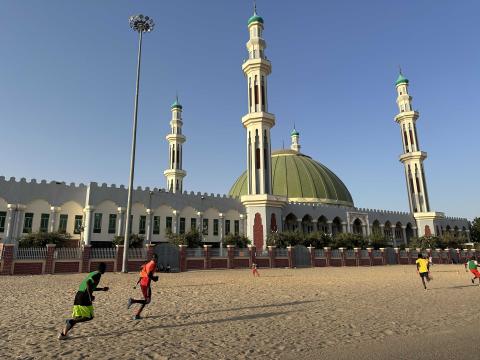
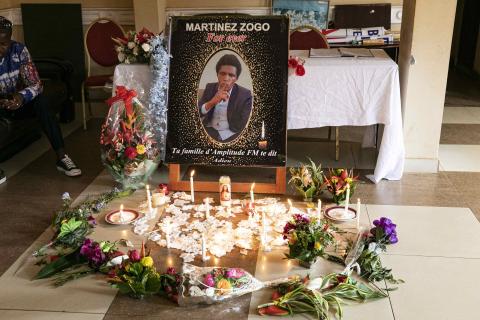
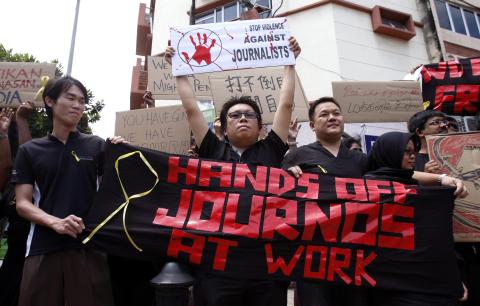
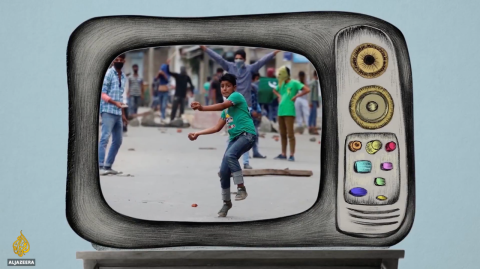

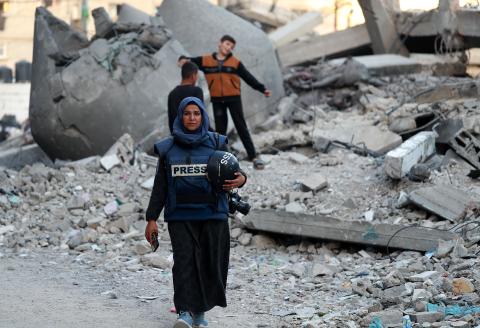

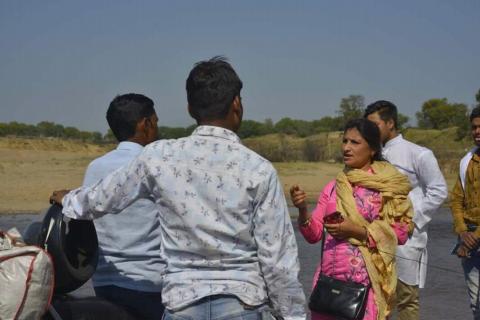
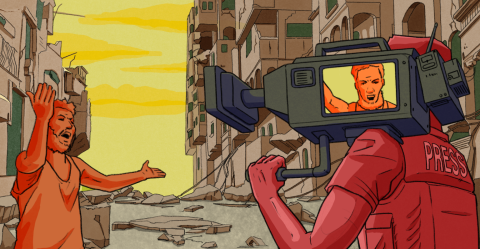
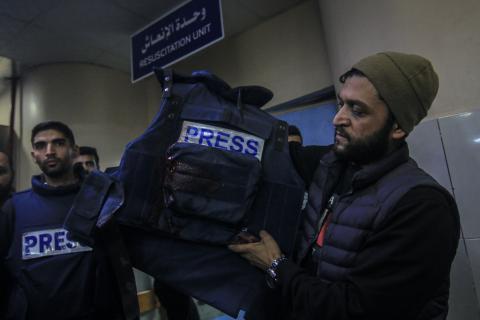

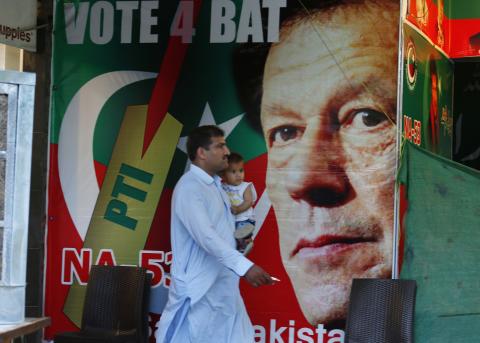


![A demonstration against Israel's war on Gaza on Paulista Avenue in São Paulo on November 4, 2023, draws attention to the deaths of children while the media focuses on the war against terrorists. [Photo: Lina Bakr]](/sites/default/files/styles/large/public/ajr/2024/Picture1.png?itok=qg2XMHwR)

